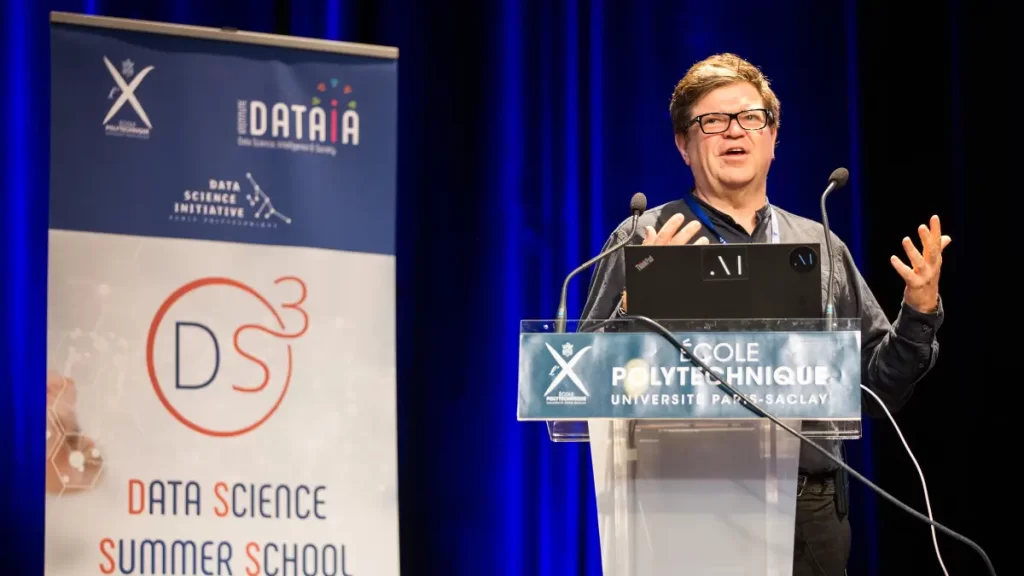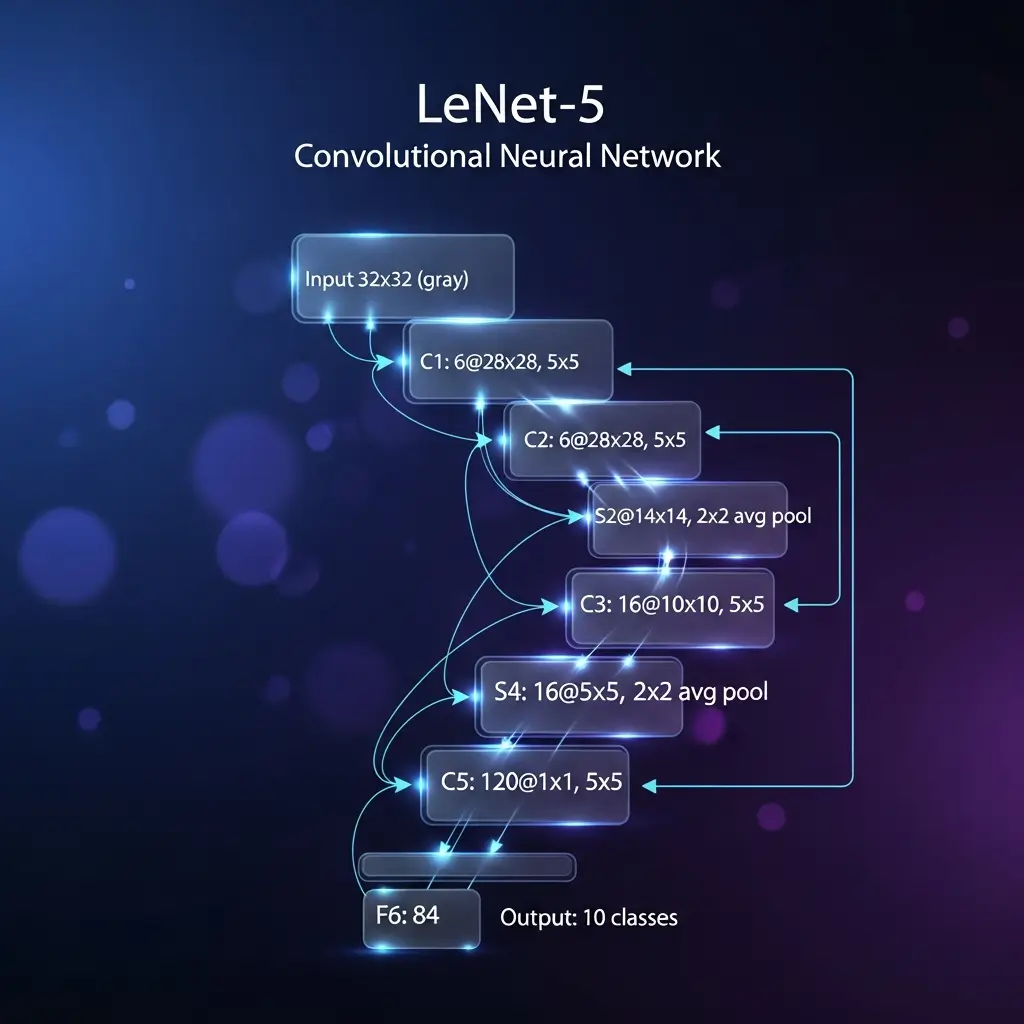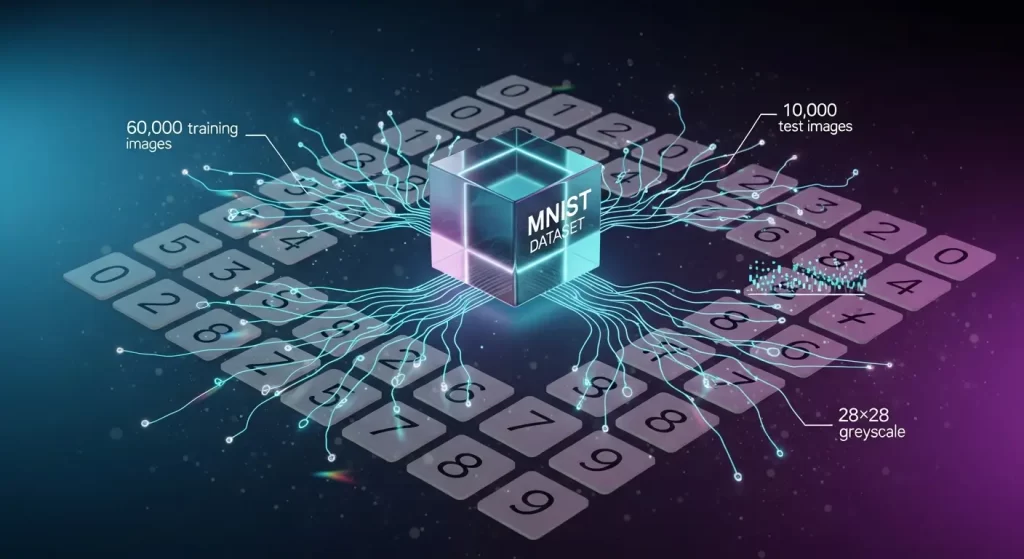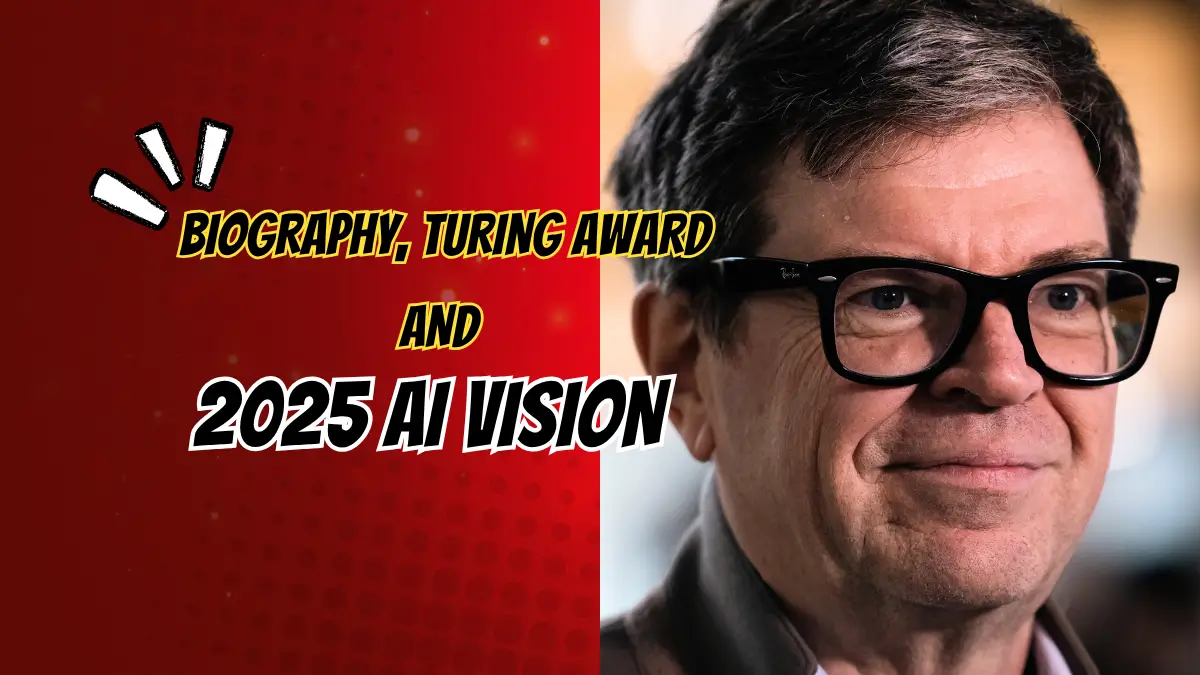Table of Contents
- Introduction
- Yann LeCun Early Life and Education
- Breakthrough at Bell Labs: Yann LeCun Inventing CNNs and Early AI Success
- Yann LeCun ‘s Academic Career at New York University
- Founding Facebook AI Research (FAIR) and Leadership at Meta
- Awards and Honors
- Vision, Philosophy, and Legacy
- FAQ
- Who is Yann LeCun?
- What is Yann LeCun known for in AI?
- What are Yann LeCun’s key contributions to machine learning?
- What is Yann LeCun’s role at Meta (Facebook)?
- Did Yann LeCun win the Turing Award?
- Why is Yann LeCun called a “godfather of AI”?
- What is Yann LeCun’s vision for the future of A
- Is Yann LeCun leaving Meta?
- Who are the three “godfathers of AI/deep learning”?
- Is Yann LeCun a genius?
- Where can I find Yann LeCun’s Google Scholar and official website?
- Does LeCun appear on Twitter/X, Threads, or LinkedIn?
- What courses or resources are linked to Yann LeCun at NYU?
- Which AI conferences feature Yann LeCun?
- Where can I watch talks or interviews with LeCun?
- What is Yann LeCun’s view on quantum computing (and Elon Musk’s comments)?
- What’s a good starter reading list inspired by LeCun?
- When will Yann LeCun officially leave Meta
- What challenges is Yann LeCun addressing with his startup
Introduction
Yann LeCun is a French-American computer scientist widely regarded as a pioneer of deep learning and a foundational figure in artificial intelligence (AI). Often called a “godfather of AI,” LeCun’s breakthroughs – from inventing convolutional neural networks (CNNs) to spearheading AI research at Facebook (now Meta) – have profoundly shaped modern machine learning. According to his LinkedIn profile, he currently serves as Chief AI Scientist at Meta and as a professor at New York University (NYU), reflecting a career that bridges cutting-edge industry innovation and academia. This comprehensive profile explores LeCun’s early life, his groundbreaking contributions to neural networks, his leadership in AI research, and of course, his vision for the future of AI.

Yann LeCun, pictured in 2024, is often referred to as one of the “godfathers of AI” for his influential work in deep learning.
Yann LeCun Early Life and Education
Born on July 8, 1960, in a suburb of Paris, Yann André LeCun showed an early aptitude for science and mathematics. He earned an engineering diploma from ESIEE Paris in 1983 and went on to complete a Ph.D. in computer science at Sorbonne University (Université Pierre et Marie Curie) in 1987. During his doctoral research, LeCun proposed innovative improvements to the back-propagation algorithm, a fundamental learning technique for neural networks. Immediately after his Ph.D., he conducted postdoctoral research under Geoffrey Hinton at the University of Toronto, a formative experience that connected him with other AI pioneers. This strong academic foundation in France and Canada set the stage for LeCun’s future breakthroughs in the United States. (Wikipedia)
Breakthrough at Bell Labs: Yann LeCun Inventing CNNs and Early AI Success
In 1988, LeCun joined AT&T’s Bell Laboratories, where he achieved one of the most celebrated milestones in computer science: the creation of the first successful convolutional neural network architecture, known as LeNet.
LeNet-5, developed in the late 1980s, was designed to recognize handwritten characters, a task critical for automating things like reading bank checks. By training this deep neural network with an early form of gradient-based learning (backpropagation), LeCun demonstrated that machines could learn visual patterns with remarkable accuracy. The system’s real-world impact was soon evident: by the late 1990s, LeCun’s OCR technology was reading an estimated 10% of all checks in the United States, a groundbreaking proof that neural networks could outperform traditional rule-based computer vision methods in practical tasks.

LeCun’s time at Bell Labs produced several other important innovations. He introduced “Optimal Brain Damage,” a technique for pruning neural network connections to improve efficiency, foreshadowing modern work on model optimization.
He also helped create the MNIST dataset – a collection of handwritten digits that became the standard benchmark for evaluating image recognition algorithms. (To this day, newcomers to deep learning often train their first models on MNIST, underscoring LeCun’s lasting influence on education and evaluation in AI.) Beyond neural networks, LeCun co-developed the DjVu image compression technology for high-quality document scanning, showcasing the breadth of his engineering contributions. These early accomplishments earned LeCun recognition not only for conceptual theory but also for engineering AI systems with real-world impact.

Yann LeCun ‘s Academic Career at New York University
After 15 years in industry research, LeCun transitioned to academia. In 2003, he joined New York University as a professor of computer science, neural science, and electrical engineering. At NYU’s Courant Institute of Mathematical Sciences, LeCun continued advancing machine learning research, focusing on areas like energy-based models (a framework for unsupervised learning) and feature learning for computer vision. He became the founding director of NYU’s Center for Data Science in 2012, helping shape one of the first interdisciplinary data science research and training centers.
During this period, LeCun remained a prolific researcher and thought leader. He co-authored numerous papers and even co-founded the International Conference on Learning Representations (ICLR) in 2013 alongside fellow deep learning luminary Yoshua Bengio. ICLR adopted an open review process that reflected LeCun’s commitment to transparency and collaboration in science. Under his mentorship at NYU, a new generation of AI researchers was trained, further cementing his legacy in the academic AI community. Despite later taking on industry roles, LeCun has continued to teach and advise students, holding the title of Silver Professor at NYU – a testament to his dual dedication to academia and industry.
Founding Facebook AI Research (FAIR) and Leadership at Meta
In late 2013, Yann LeCun made headlines by joining Facebook (now Meta) to launch and lead its new AI initiative. As the founding director of Facebook AI Research (FAIR), LeCun built a world-class research lab within the company dedicated to open, fundamental AI research. FAIR’s mission, much like an academic lab, was to advance the state of the art in AI and publish findings openly, rather than focus solely on near-term product development. LeCun’s move underscored a broader trend of top academics being tapped by tech giants to bolster AI capabilities.
As Meta’s Chief AI Scientist, LeCun oversaw ambitious projects in computer vision, natural language processing, robotics, and more. He championed an open-source AI culture, leading Meta to release research code and models to the public. For example, Meta (under LeCun’s influence) shared big contributions like the PyTorch deep learning framework (initially developed within Facebook’s AI labs) and later open-sourced large language models. LeCun has argued that openness accelerates innovation across the field, distinguishing Meta’s approach from more closed labs. He often cites Meta’s tradition of sharing AI breakthroughs openly, contrasting it with companies that keep models proprietary.
Championing New AI Paradigms
Within Meta, LeCun has also been a prominent voice advocating for next-generation AI approaches. While much of the industry in recent years has focused on massive large language models (LLMs) as a path to advanced AI, LeCun has publicly expressed skepticism that scaling up language prediction alone will achieve human-level intelligence. He has argued that true artificial general intelligence (AGI) will require grounding in the physical world and the ability to learn from observation in a self-directed way. In line with this view, LeCun promotes self-supervised learning, a method where AI systems learn from unlabeled data by predicting parts of their input, calling it the “dark matter of intelligence” that could unlock more human-like learning.
This vision involves developing world models (AI that can understand how the world works by learning physics and causality from video and sensor data) rather than relying purely on text-based training. LeCun’s contrarian stance has sparked healthy debate in the AI community, especially as he maintains this viewpoint even while Meta itself pours resources into LLMs. By persistently advocating for alternatives, LeCun pushes the field to consider broader approaches beyond the current hype cycles.
LeCun’s influence at Meta also extended to organizational philosophy. He has been a strong proponent of collaboration between AI labs and academia, and he led by example, keeping one foot in university research at NYU while leading an industry lab. Under his guidance, Meta’s AI division not only advanced core research but also frequently engaged with the wider community through workshops, challenges, and open publications. This approach helped Meta attract top talent and stay at the forefront of AI research.
A New Chapter: From Meta to Startup
In late 2025, news emerged that Yann LeCun planned to leave Meta to launch his own startup. After over a decade of guiding Meta’s AI endeavors, he began exploring a new venture, reportedly holding early talks to raise funding. This development coincided with Meta’s restructuring of its AI teams, including the creation of a new “Superintelligence” lab led by a different executive, signaling a shift in LeCun’s role. While details of his startup remain under wraps, the move underscores LeCun’s enduring entrepreneurial spirit and desire to drive innovation on his own terms. Even as he departs the corporate setting, he remains a towering figure whose next steps are eagerly watched by the tech world.
Awards and Honors
Yann LeCun’s contributions have earned him some of the highest honors in science and technology. In 2018, he alongside Geoffrey Hinton and Yoshua Bengio – received the prestigious ACM Turing Award, often called the “Nobel Prize of computing.” The Turing Award recognized their breakthroughs in deep neural networks, which laid the groundwork for today’s AI revolution. This trio of researchers is affectionately nicknamed the “godfathers of deep learning” for their pioneering roles. LeCun’s accolades also include being named a Fellow of the AAAI (Association for the Advancement of Artificial Intelligence) in 2019 and being inducted into both the U.S. National Academy of Sciences and National Academy of Engineering, rare honors that reflect peer recognition of his impact across disciplines.
In 2023, LeCun was honored in his birthplace of France with the Legion of Honour, and in 2025 he was one of seven co-recipients of the Queen Elizabeth Prize for Engineering. The QEPrize specifically celebrated the leaders of modern machine learning (LeCun among them) for engineering innovations that have transformed the world These awards underscore that LeCun’s work is not only academically groundbreaking but also of profound benefit to society at large. From enabling ubiquitous image recognition to inspiring countless researchers, his influence is deeply woven into the fabric of today’s technology.
Vision, Philosophy, and Legacy
Beyond the titles and awards, Yann LeCun’s legacy is defined by a consistent vision for AI. Throughout his career, he has emphasized learning and adaptability as the core of intelligence. He often notes that human and animal intelligence arises from mastering many tasks through observation and trial, a principle he tries to instill in AI via self-supervised learning and other biologically inspired approaches.
LeCun is generally optimistic about AI’s potential and is known for a measured view on AI safety: while he acknowledges the importance of ethics and responsible AI, he has downplayed apocalyptic fears, arguing that today’s AI systems are nowhere near true autonomy or understanding. Instead, he focuses on concrete challenges like building AI that can reason, remember, and plan capabilities that current systems still lack.
LeCun’s communication style is frank, witty, and rich with analogies, has made him a sought-after voice in discussions about the future of AI. He frequently shares insights on social media and in interviews, demystifying AI advancements for the public and pushing back against misconceptions. For instance, he has compared the current AI systems to “blurry mirrors” of human intelligence: impressive in narrow tasks but still missing fundamental pieces of learning and common sense.
As of today, Yann LeCun stands as both an architect of AI’s history and an active driver of its future. The technologies we take for granted – from instant face recognition in photos to digital assistants that understand speech, owe a debt to LeCun’s innovations. And his work is far from done. Whether in corporate labs, academia, or a startup garage, LeCun continues to chase the next big breakthrough in AI. His story exemplifies the synergy of academic rigor and industry application, and his legacy will undoubtedly endure in the intelligent systems that increasingly define our world. In the pantheon of computing and AI luminaries, Yann LeCun’s name is etched among the very brightest.
FAQ
Who is Yann LeCun?
Yann LeCun is a French-American computer scientist and a pioneer in the field of artificial intelligence. He is best known for inventing key deep learning technologies like convolutional neural networks and for serving as Chief AI Scientist at Meta (formerly Facebook). LeCun is also a professor at New York University and is often called one of the “godfathers of AI” for his influential role in modern machine learning.
What is Yann LeCun known for in AI?
LeCun is known primarily for his groundbreaking work in deep learning. He developed LeNet, one of the first convolutional neural network architectures, which dramatically improved image recognition and optical character recognition. This work laid the foundation for today’s neural networks used in computer vision. He’s also known for creating the MNIST dataset (a standard benchmark in machine learning), for co-founding Facebook’s AI Research lab (FAIR), and for his advocacy of self-supervised learning as a key approach to advancing AI.
What are Yann LeCun’s key contributions to machine learning?
Yann LeCun’s key contributions include the development of convolutional neural networks (which enable computers to recognize images and patterns), the introduction of methods to make neural networks more efficient (such as the “Optimal Brain Damage” pruning technique), and the creation of important tools and datasets (like the MNIST handwritten digit database). He also played a leading role in bringing deep learning into practical use – for example, his CNN-based system for reading bank checks was one of the first widespread commercial uses of deep neural networks. Additionally, through his roles at NYU and Meta, LeCun has mentored researchers and driven forward areas like computer vision, robotics, and autonomous systems.
What is Yann LeCun’s role at Meta (Facebook)?
Yann LeCun joined Facebook (now Meta) in 2013 to establish and lead the company’s AI research division. His role is Chief AI Scientist at Meta, where he has overseen long-term AI research and strategy. He founded the Facebook AI Research (FAIR) lab, building a team that works on fundamental advances in AI (often in collaboration with academic institutions). Under his leadership, Meta’s AI team has developed cutting-edge AI models and openly shared many of its tools with the research community. (As of late 2025, it has been reported that LeCun plans to leave Meta to start his own AI-focused venture, marking the end of an era at the company.)
Did Yann LeCun win the Turing Award?
Yes. In 2018, Yann LeCun was one of the recipients of the ACM A.M. Turing Award, which is one of the highest honors in computer science. He shared this award with Geoffrey Hinton and Yoshua Bengio. The trio was recognized for their contributions to deep learning – specifically for conceptual and engineering breakthroughs that have made deep neural networks a critical component of modern computing. The Turing Award solidified LeCun’s status as a leading figure in AI research.
Why is Yann LeCun called a “godfather of AI”?
The nickname “godfather of AI” (or more precisely, “godfather of deep learning”) is often applied to Yann LeCun, along with Geoffrey Hinton and Yoshua Bengio. It signifies that they are the pioneering elders of the deep learning revolution. LeCun earned this moniker by being among the first to develop the techniques that enabled neural networks to succeed (like convolutional neural networks for vision), at a time when neural nets were not popular. His sustained contributions over decades and mentorship of many students have had a “foundational” impact on the AI field – hence the affectionate title.
What is Yann LeCun’s vision for the future of A
Yann LeCun envisions AI systems that learn more like humans and animals do. He is a strong proponent of self-supervised learning, where AI can learn from vast amounts of unlabeled data by observing patterns, rather than relying solely on human-labeled examples. LeCun believes this approach will be key to achieving more general, human-level intelligence in machines. He also advocates for AI that can understand and interact with the physical world (for example, learning physics and common sense), as opposed to just processing text. In public discussions, LeCun has expressed optimism that AI will continue to advance and benefit society, and he emphasizes openness and research to solve AI’s toughest challenges (rather than halting progress out of fear). Overall, his vision is to develop AI that can learn, reason, and adapt in a versatile way, ultimately leading to intelligent systems that complement human capabilities.
Is Yann LeCun leaving Meta?
According to reports in late 2025, Yann LeCun plans to leave his position as Chief AI Scientist at Meta to start his own AI-focused startup. This news came after Meta restructured its AI teams, and LeCun was said to be in early stages of launching a new venture. While he has not publicly detailed his startup’s plans yet, the move suggests LeCun is looking to pursue new research directions or applications outside of Meta’s umbrella. Even after leaving Meta, he is expected to remain an influential figure in AI, through both his new project and his ongoing role as a professor at NYU
Who are the three “godfathers of AI/deep learning”?
They’re commonly cited as Yann LeCun, Geoffrey Hinton, and Yoshua Bengio, jointly awarded the 2018 Turing Award for breakthroughs that made deep neural networks a central tool in computing.
Is Yann LeCun a genius?
Genius is subjective. Still, Yann LeCun’s impact on AI is hard to dispute: he helped pioneer convolutional neural networks and authored widely cited papers that shaped the field. His industry leadership and the ACM A.M. Turing Award further attest to his outsized influence.
Where can I find Yann LeCun’s Google Scholar and official website?
Scholar: Search “Yann LeCun Google Scholar” to access his citation profile.
Website: His long-running personal site hosts publications, talks, and resources.
Does LeCun appear on Twitter/X, Threads, or LinkedIn?
Yes, he’s active on social platforms (handles can change). Search “Yann LeCun Twitter/X,” “Yann LeCun Threads,” or LinkedIn to reach verified profiles.
What courses or resources are linked to Yann LeCun at NYU?
At NYU, Yann LeCun’s core teaching resource is DS-GA 1008 Deep Learning at the Center for Data Science, with official descriptions and archived materials available via the course bulletin and public course sites (DS-GA 1008 bulletin, Spring 2021 site). For affiliation, contact, and research-overview details, refer to his institutional profiles at the Courant Institute and Tandon School of Engineering (Courant faculty page, Tandon profile). For comprehensive reading lists, slides, and talks, consult his official website and Google Scholar (yann.lecun.com, Scholar profile)
Which AI conferences feature Yann LeCun?
Yann LeCun most often appears at top-tier AI venues—especially ICLR (which he co-founded), NeurIPS, and CVPR—as an author, keynote, or invited speaker. He has also appeared at ICML, AAAI, and vision-focused events like ECCV. Beyond conferences, you’ll find longer lectures and summer-school sessions via CIFAR’s Learning in Machines & Brains and major university colloquia. Always check the current year’s program to confirm appearances, as lineups change annually.
Where can I watch talks or interviews with LeCun?
You can watch Yann LeCun’s talks and interviews via his official Videos hub and curated YouTube playlists (Talks, Lectures, Interviews) — start here: youtube.com/@YannLeCunPhD, plus the Talks playlist: link. Yann LeCun+2YouTube+2
For long-form interviews, see his appearance on the Lex Fridman Podcast (YouTube video: #416; full transcript: lexfridman.com). YouTube+1
Academic and conference lectures are frequently posted online. For example, this 2025 special lecture “Self-Supervised Learning, JEPA, World Models” (YouTube) and his broader Lecture Series playlist (YouTube). YouTube+1
For mainstream interviews and news segments, see appearances like CBS Mornings discussing the future of AI (YouTube).
What is Yann LeCun’s view on quantum computing (and Elon Musk’s comments)?
LeCun’s public focus is machine learning, not quantum; occasional comments emphasize practical ML progress. Musk’s views on quantum computing are separate and not specific to LeCun’s research.
What’s a good starter reading list inspired by LeCun?
LeNet/CNN papers
Nature 2015 “Deep Learning” (with Hinton & Bengio)
MNIST papers/tutorials
Recent self-supervised and EBM overviews from his talks/posts
When will Yann LeCun officially leave Meta
What challenges is Yann LeCun addressing with his startup
Yann LeCun’s startup will focus on addressing challenges related to developing AI systems with a deeper, more nuanced understanding of the world, known as “world models.” These models aim to simulate cause-and-effect scenarios and have a better internal understanding of their environment to predict outcomes, unlike current large language models (LLMs) that LeCun believes still fall short of true intelligence.
His approach confronts the limitations of today’s popular AI methods that largely rely on scaling data and brute force computational power, which he feels do not offer genuine understanding or intelligence. LeCun is skeptical of the current hype around LLMs, arguing that AI needs to reach a level of cognition comparable to that of a house cat before worrying about superintelligence.
The startup will pursue foundational research into AI systems capable of simulating the physical and causal world, offering a path to artificial general intelligence (AGI) that is different from the product-driven, immediate-results focus Meta is adopting. This shift reflects LeCun’s desire to continue long-term, patient AI research without the corporate constraints at Meta, especially as his division’s work has been overshadowed by Meta’s new AI units focused on rapid product development.

Leave a Reply